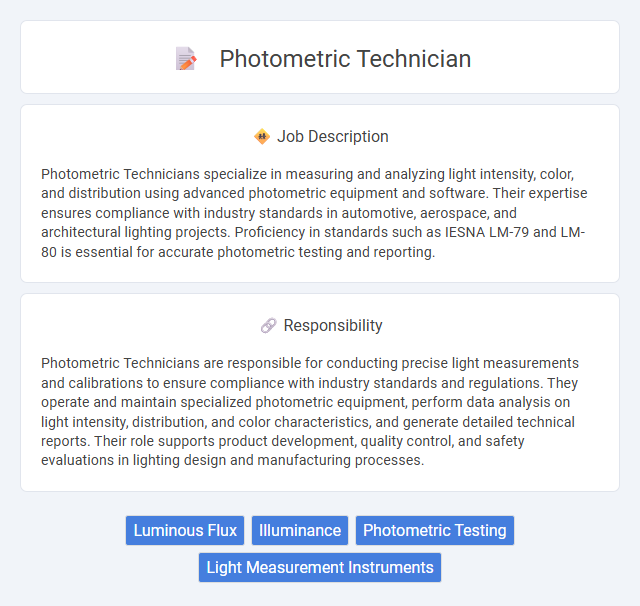
Photometric Technicians specialize in measuring and analyzing light intensity, color, and distribution using advanced photometric equipment and software. Their expertise ensures compliance with industry standards in automotive, aerospace, and architectural lighting projects. Proficiency in standards such as IESNA LM-79 and LM-80 is essential for accurate photometric testing and reporting.
Individuals with strong attention to detail and a keen interest in optics or lighting technology are likely well-suited for a Photometric Technician role. Those who prefer hands-on technical work and can maintain focus during repetitive measurement procedures may find this position fitting. People who struggle with precision or have limited patience for methodical testing might face challenges in this job.
Qualification
A Photometric Technician typically requires a background in optical engineering, physics, or a related technical field, often supported by an associate or bachelor's degree. Proficiency in photometric measurement equipment, software for data analysis, and familiarity with standards such as IESNA or CIE is essential. Experience with precision instrumentation calibration and a strong understanding of light measurement principles enhances job performance and career advancement.
Responsibility
Photometric Technicians are responsible for conducting precise light measurements and calibrations to ensure compliance with industry standards and regulations. They operate and maintain specialized photometric equipment, perform data analysis on light intensity, distribution, and color characteristics, and generate detailed technical reports. Their role supports product development, quality control, and safety evaluations in lighting design and manufacturing processes.
Benefit
Photometric Technicians may experience benefits such as competitive salaries and opportunities for skill development in lighting measurement and calibration. There is a likelihood of gaining hands-on experience with advanced photometric equipment, which can enhance career prospects. Job stability and potential for growth in sectors like automotive, aerospace, and manufacturing could also be expected.
Challenge
Photometric Technician roles likely involve complex challenges related to accurately measuring and analyzing light properties in various environments. There is a probable need to troubleshoot sophisticated equipment and interpret data with precision to ensure compliance with stringent industry standards. Managing variable lighting conditions and adapting to evolving technological advancements could further test a technician's problem-solving skills.
Career Advancement
Photometric Technicians specializing in light measurement and analysis gain expertise crucial for roles in optical engineering and quality assurance. Mastery of advanced photometric instruments and data interpretation fosters opportunities for promotion to senior technician or laboratory supervisor positions. Continuous certification and familiarity with industry standards accelerate career growth in lighting technology and manufacturing sectors.
Key Terms
Luminous Flux
A Photometric Technician specializes in measuring and analyzing luminous flux to ensure lighting products meet specified brightness and efficiency standards. Proficiency with integrating spheres and photometers is essential for accurate luminous flux assessments, directly impacting product quality and compliance with industry regulations. Expertise in interpreting luminous flux data supports optimizing lighting designs for energy efficiency and visual performance.
Illuminance
Photometric Technicians specialize in measuring and analyzing illuminance levels to ensure optimal lighting conditions in various environments. They utilize advanced lux meters and photometers to capture accurate data on light intensity and distribution, supporting compliance with industry standards such as IESNA and CIE. Their role is critical in designing energy-efficient lighting systems that enhance visibility, safety, and aesthetic appeal in commercial, industrial, and residential projects.
Photometric Testing
Photometric Technicians specialize in conducting precise photometric testing to measure the intensity, distribution, and color characteristics of light sources. They utilize advanced instruments such as goniophotometers and integrating spheres to ensure lighting products meet industry standards like LM-79 and LM-80. Accurate photometric data collected by these technicians is critical for product development, quality control, and compliance with regulatory requirements in the lighting industry.
Light Measurement Instruments
Photometric Technicians specialize in operating and calibrating light measurement instruments such as spectroradiometers, goniophotometers, and lux meters to evaluate luminous intensity, color temperature, and photometric accuracy. They analyze data from these devices to ensure compliance with lighting standards and improve product performance in industries like automotive, aerospace, and architectural lighting. Expertise in handling integrating spheres and luminance meters is essential for precise measurement of LED and other light sources.
 kuljobs.com
kuljobs.com